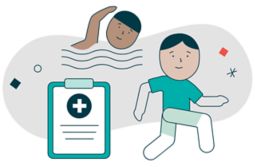It's now possible to hear the fetus's heartbeat with a special ultrasound device. And the fetus's organs are developing.

It's okay to exercise. Try activities such as walking or swimming. Check with your doctor before starting a new program.
10 things to know for weeks 10 to 14 of pregnancy
You may feel more tired than usual. Taking naps during the day may help.
You may feel emotional. It might help to talk to someone.
You may have headaches. Try lying down and putting a cool cloth over your forehead.
You can use acetaminophen (Tylenol) for pain relief. Don't take any anti-inflammatory medicines (such as Advil, Motrin, Aleve), unless your doctor says it's okay.
You may feel a fullness or aching in your lower belly. This can feel like the kind of cramps you might get before a period. A back rub may help.
You may need to urinate more. Your growing uterus and changing hormones can affect your bladder.
You may feel sick to your stomach (morning sickness). Try avoiding food and smells that make you feel sick.
Your breasts may feel different. They may feel tender or get bigger. Your nipples may get darker. Try a bra that gives you good support.
Avoid alcohol, tobacco, and drugs (including marijuana). If you need help quitting, talk to your doctor.
Take a daily prenatal vitamin. Choose one with folic acid.
Follow-up care is a key part of your treatment and safety. Be sure to make and go to all appointments, and contact your doctor if you are having problems. It's also a good idea to know your test results and keep a list of the medicines you take.
When should you call for help?
Call 911 anytime you think you may need emergency care. For example, call if:
- You have severe vaginal bleeding. You have soaked through one or more pads in an hour, and the bleeding is not slowing down.
- You have chest pain, are short of breath, or cough up blood.
- You have sudden, severe pain in your belly that does not go away.
- You passed out (lost consciousness).
Call your doctor or midwife now or seek immediate medical care if:
- You have a fever.
- You have vaginal bleeding.
- You are dizzy or lightheaded, or you feel like you may faint.
- You have signs of a blood clot in your leg (called a deep vein thrombosis), such as:
- Pain in the calf, back of the knee, thigh, or groin.
- Swelling in your leg or groin.
- A color change on the leg or groin. The skin may be reddish or purplish.
- You have symptoms of a urinary tract infection. These may include:
- Pain or burning when you urinate.
- A frequent need to urinate without being able to pass much urine.
- Pain in your low back (below the rib cage and above the waist).
- Blood in your urine.
- You have belly pain.
- You think you are having contractions.
Watch closely for changes in your health, and be sure to contact your doctor or midwife if:
- You have vaginal discharge that smells bad.
- You feel sad, anxious, or hopeless for more than a few days.
- You have other concerns about your pregnancy.
Where can you learn more?
Go to http://www.healthwise.net/patientEd
Enter E090 in the search box to learn more about "Weeks 10 to 14 of Your Pregnancy: Care Instructions".
Current as of: July 15, 2025
Author: Ignite Healthwise, LLC Staff
Clinical Review Board
All Ignite Healthwise, LLC education is reviewed by a team that includes physicians, nurses, advanced practitioners, registered dieticians, and other healthcare professionals.

